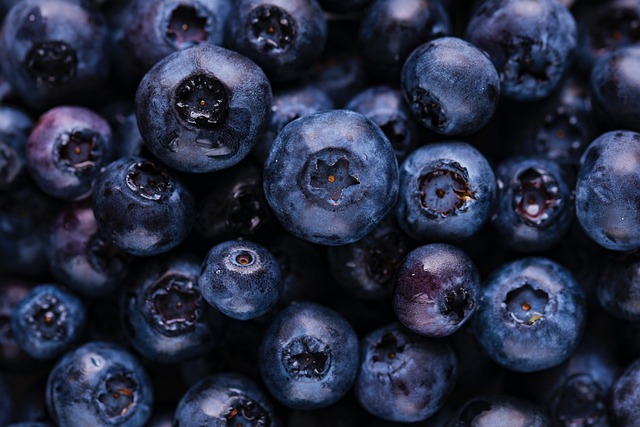Can Rabbits Have Blueberries?

If you’re wondering whether or not rabbits can eat blueberries, you’ve come to the correct spot. Learn if it is safe for kids to consume blueberries and whether it may hurt them. Here are some pointers to assist you to make a culinary selection.
Can rabbits eat blueberries?
Blueberries are low in calories and high in fiber, potassium, and vitamin C. They also have a high concentration of antioxidants. Blueberries, when consumed in moderation, may help decrease blood sugar and avoid heart disease. Blueberry peels are also rich in vitamins and minerals.
When it comes to feeding blueberries to rabbits, though, you should proceed with caution and contact a veterinarian first. Begin slowly and gradually increase the number of blueberries your rabbit eats. The appropriate quantity to feed your rabbit will be determined by its age and weight.
You may feed your rabbit tiny quantities of fresh blueberries if you maintain a supply on hand. This will not create any health issues, but bigger doses may. Because blueberries contain a lot of water and sugar, you’ll need to keep track of how much blueberries your rabbit eats. If consumed in high quantities, blueberries may induce digestive irritation and weight gain.
According to Charlie Riel of the “Rabbits Dad” website, blueberries should be introduced cautiously to your rabbit and should be clean. Furthermore, you should properly wash the leaves to eliminate any dangerous substances. In this manner, you can ensure that your rabbit’s health is not jeopardized. You should also keep an eye on their digestion since rabbits like to leave a trail of leftover food.
Blueberries are a favorite rabbit food that is high in fiber. They include a lot of potassium and vitamin C. Blueberries are also low in calories. However, the sugar level is considerable, which may lead to a variety of health issues in rabbits. So, although blueberries are a tasty treat for rabbits, be careful not to overfeed them.
Your rabbit can eat blueberry leaves and seeds. Your rabbit may simply harvest blueberry leaves. The stems make excellent chew toys and are a natural source of dental treatment for your pet. If you’re going to offer your rabbit blueberries as a treat, be sure you thoroughly wash them first.
While blueberries are a tasty treat for rabbits, it is best to restrict their consumption to a few berries each day. You should also keep an eye on their teeth and weight. Overconsumption of blueberries may result in a variety of health problems, including obesity, dental decay, and renal failure. To prevent any of these issues, feed your rabbit a diet rich in fresh vegetables and fruits.
Blueberries are high in both fiber and sugar. Blueberries may be fed to rabbits fresh, frozen, or dried. Fresh blueberries, on the other hand, are better for rabbits since they are more hydrating and have a lower sugar level. Look for a nearby grocery shop that offers fresh blueberries. When purchasing blueberries, be sure to thoroughly wash them to prevent polluting your rabbit’s digestive system with filthy waste.
Is it okay to feed them blueberries?
Blueberries may be given to your rabbit as a reward, but you must first wash them before giving them to them. Blueberries are not suited for rabbits with delicate digestive systems, so introduce them gradually and in moderate quantities. You should also keep a careful eye on your rabbit’s stomach since blueberries might create issues.
Blueberries are high in antioxidants, but they are also high in sugar. Excess sugar may lead to a variety of health concerns in rabbits, including poor dental health, obesity, and digestive disorders. Furthermore, too much sugar might cause diarrhea. As a result, rabbits should only ingest berries in modest quantities if they are fond of them.
However, before giving blueberries to your rabbit, you should first see a veterinarian. Furthermore, while initially providing blueberries to your rabbit, keep a tight eye on it to observe whether it feces frequently. If your rabbit is pooping often, it is digesting the blueberries properly.
It is vital to remember that the skin of the blueberry is the least dangerous component of the fruit. The majority of the fiber and antioxidants are found in the skin. The inside, on the other hand, contains a limited number of seeds that may be detrimental to rabbits. As a result, it’s important to wash the fruit before feeding it to your rabbit.
Blueberries, on the other hand, are heavy in fruit sugar, which is not good for rabbits. It may also result in gastrointestinal and dental issues. Furthermore, eating too many blueberries might contribute to obesity. If you want to feed your rabbit blueberries regularly, you should try feeding them a tiny quantity once or twice a week.
You may give your rabbit three different kinds of blueberries. They are available fresh, frozen, and dried. Fresh blueberries provide the most nutritional value. The nutrients in dried and frozen ones are lower. Blueberry jam, on the other hand, should be avoided since it contains too much sugar and not enough nutrition. Jam may also include pectin and lemon juice, both of which are toxic to rabbits.
Blueberries’ phytochemicals are good for rabbits because they help remove free radicals that may harm their body’s cells. This, in turn, protects rabbits from a variety of ailments. Blueberries are also abundant in fiber, vitamin C, and vitamin K. Blueberries, on the other hand, might produce bloating if consumed in excess. Furthermore, the high sugar content of blueberries might promote hyperactivity in your rabbit.
Blueberries are not toxic to rabbits in little amounts. Fresh blueberries are more nutritious than yogurt. Furthermore, each blueberry has just one calorie of sugar. You should, however, properly wash your blueberries before feeding them to your rabbit.
Furthermore, blueberries are rich in fiber and low in calories, making them beneficial to your rabbit’s digestion. Furthermore, their fiber content aids in the maintenance of a steady blood sugar level. Blueberries are rich in nutrition, and most rabbits like them.
Is it associated with weight gain?
Blueberries are a favorite food of rabbits. They also have a high fiber content, which is helpful to rabbits. They also aid in the proper functioning of their digestive systems. Furthermore, they maintain their teeth healthy, which is vital for their overall health. Because rabbit teeth are always developing, it is critical to keep them filed and healthy. Blueberries, on the other hand, should be avoided by rabbits since they might make them sick.
While we may give rabbits a broad range of fruits and vegetables, eating too much of them can lead to obesity. As a consequence, many physicians advise against overfeeding blueberries to rabbits. Furthermore, since blueberries are rich in fruit sugar, they should only be given as a treat.
When giving blueberries to rabbits, properly wash the fruit. Blueberry skin includes vitamins and minerals. Before giving blueberries to your rabbit, properly wash them and allow them to pass through without difficulty. Blueberries also include seeds, which your rabbit may not like.
Blueberries may create stomach difficulties in rabbits who do not generally consume fruit regularly. One or two blueberries every week is a reasonable rule of thumb for your rabbit. Most rabbits will be OK with this quantity. You may gradually increase the quantity, but be careful not to overfeed them. If you have an allergic reaction, stop eating the blueberries and visit your veterinarian.
Rabbits should eat a high-fiber, low-calorie diet. They also need some plant-based protein. Blueberries are high in fiber and protein with few calories. They’re also an excellent natural treat for rabbits. Blueberries are an excellent option for rabbits, but keep an eye on their consumption and weight.










